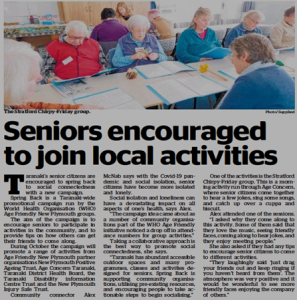Spring Back Campaign



The Spring Back campaign was a promotional initiative aimed at encouraging social and community connectedness among older people/kaumātua in New Plymouth of the Taranaki region in New Zealand. The goal of the campaign was to remind older people of the activities that take place in their local area and encourage others to help them get involved. The campaign was prompted by the increasing issue of social isolation and loneliness among older people due to the COVID-19 pandemic and associated lockdowns. Social isolation and loneliness can have a significant impact on the health and well-being of older people, and the WHO Age-Friendly New Plymouth group sought to address this issue with the Spring Back campaign. The campaign was supported by a group of key community organizations in Taranaki, including Age Concern, Positively Ageing, and the New Plymouth District Council, among others.
Main target group: Older people in general
Other target group(s): Social isolation due to COVID
Sector(s): Social protection
Desired outcome for older people:
Build and maintain relationships